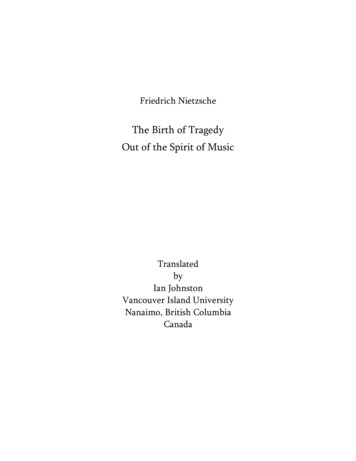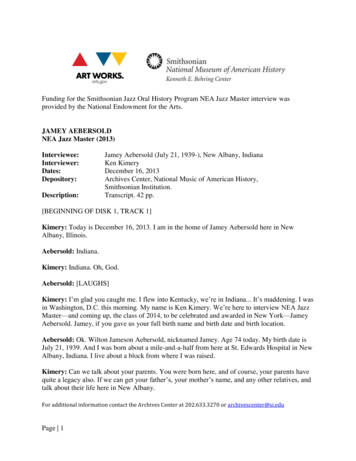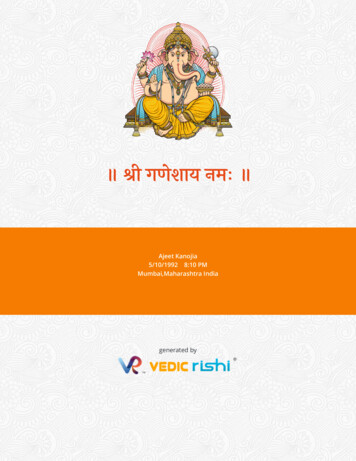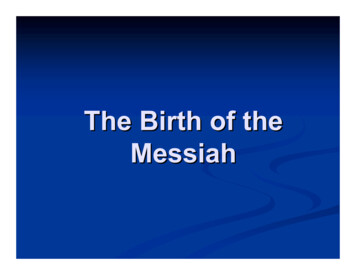
Transcription
Friedrich NietzscheThe Birth of TragedyOut of the Spirit of MusicTranslatedbyIan JohnstonVancouver Island UniversityNanaimo, British ColumbiaCanada
2The Birth of TragedyTable of ContentsTranslator’s Note . . . . . . . . . . . . . . . . . . . . . . . . . . . . . . . . . . . . . . . . . . . . . . . . . . . . . . . . . . . . . . . . . . . . 2An Attempt at Self Criticism . . . . . . . . . . . . . . . . . . . . . . . . . . . . . . . . . . . . . . . . . . . . . . . . . . . . . . . . . . 3Preface to Richard Wagner . . . . . . . . . . . . . . . . . . . . . . . . . . . . . . . . . . . . . . . . . . . . . . . . . . . . . . . . . . 10Birth of Tragedy . . . . . . . . . . . . . . . . . . . . . . . . . . . . . . . . . . . . . . . . . . . . . . . . . . . . . . . . . . . . . . . . . . . 11About the Translator . . . . . . . . . . . . . . . . . . . . . . . . . . . . . . . . . . . . . . . . . . . . . . . . . . . . . . . . . . . . . . . 85Translator’s NoteIn the following translation, most of Nietzsche’s long paragraphs have been broken up into shorterunits. Where Nietzsche uses a foreign phrase this text retains that phrase and includes an Englishtranslation in square brackets and italics immediately afterwards (for example, [translation]).Explanatory footnotes, usually to identify a person named in the text, have been added by thetranslator.Readers are permitted to download this translation for their own use, and teachers may distributed thetext to their students in printed or electronic form without permission and without charge. There are,however, copyright restrictions on publishing the translation as a printed book.This translation was last revised in June 2008.Historical NoteThe Birth of Tragedy, Nietzsche’s first book, was published in 1872, when he was 28 years old and aprofessor of classical philology at Basel. The book had its defenders but, in general, provoked a hostilereception in the academic community and affected Nietzsche’s academic career for the worse. As theopening section (added in 1886) makes clear, Nietzsche himself later had some important reservationsabout the book. However, since that time the work has exerted an important influence on the historyof Western thought, particularly on the interpretations of Greek culture.In later editions part of the title of the work was changed from “Out of the Spirit of Music” to“Hellenism and Pessimism,” but the former phrase has remained more common.
3Friedrich NietzscheThe Birth of TragedyAn Attempt at Self-Criticism1Whatever might have been be the basis for this dubious book, it must have been a question of theutmost importance and charm, as well as a deeply personal one at the time — testimony to that effectis the time in which it arose, in spite of which it arose, that disturbing era of the Franco-Prussian warof 1870-71. While the thunderclap of the Battle of Wörth was reverberating across Europe, themeditative lover of enigmas whose lot it was to father this book sat somewhere in a corner of the Alps,extremely reflective and perplexed, thus simultaneously very distressed and carefree, and wrote downhis thoughts about the Greeks — the kernel of that odd and difficult book to which this later preface(or postscript) should be dedicated.2 A few weeks after that, he found himself under the walls of Metz,still not yet free of the question mark which he had set down beside the alleged “serenity” of the Greeksand of Greek culture, until, in that month of the deepest tension, as peace was being negotiated inVersailles, he finally came to peace with himself and, while slowly recovering from an illness he'dbrought back home with him from the field, finished composing the Birth of Tragedy out of the Spiritof Music.3— From music? Music and tragedy? The Greeks and the Music of Tragedy? The Greeks and the art workof pessimism? The most successful, most beautiful, most envied people, those with the most encouragingstyle of life so far — the Greeks? How can this be? Did they of all people need tragedy? Even more —art? What for — Greek art?One can guess from all this just where the great question mark about the worth of existence was placed.Is pessimism necessarily the sign of collapse, destruction, of disaster, of the exhausted and enfeebledinstincts — as it was with the Indians, as it is now, to all appearances, among us, the “modern” peoplesand Europeans? Is there a pessimism of strength? An intellectual inclination for what in existence ishard, dreadful, evil, problematic, emerging from what is healthy, from overflowing well being, fromliving existence to the full? Is there perhaps a way of suffering from the very fullness of life? A temptingcourage of the keenest sight which demands what is terrible as the enemy, the worthy enemy, againstwhich it can test its power, from which it wants to learn what “to fear” means?What does the tragic myth mean precisely for the Greeks of the best, strongest, and bravest age? Whatabout that tremendous phenomenon of the Dionysian?4 And what about what was born out of theDionysian — the tragedy? — And by contrast, what are we to make of what killed tragedy — Socratic1Note that this first section of the Birth of Tragedy was added to the book many years after it first appeared, as the text makesclear. Nietzsche wrote this “Attempt at Self- Criticism” in 1886. The original text, written in 1870-71, begins with the Prefaceto Richard Wagner, the second major section in this text.2The Battle of Wörth occurred in August 1870. The German army defeated the French army.3Nietzsche contracted a serious and lingering illness while serving as a medical orderly with the Prussian forces in theFranco-Prussian War. The illness forced him eventually to give up his academic position.4In Greek mythology, Dionysus, son of Zeus and the mortal Semele, was the god of wine, associated with ecstatic andintoxicated group rituals.
4morality, dialectic, the satisfaction and serenity of the theoretical man?1 How about that? Could notthis very Socratism [Sokratismus] be a sign of collapse, exhaustion, sickness, the anarchic dissolutionof the instincts? And could the “Greek serenity” of later Greek periods be only a red sunset? Could theEpicurean will hostile to pessimism be merely the prudence of a suffering man?2 And even science itself,our science — indeed, what does all science in general mean considered as a symptom of life? What isthe point of all that science and, even more serious, where did it come from? What about that? Isscientific scholarship perhaps only a fear and an excuse in the face of pessimism? A delicate self-defenceagainst — the Truth? And speaking morally, something like cowardice and falsehood? Speakingunmorally, a clever trick?3 O Socrates, Socrates, was that perhaps your secret? O you secretive ironist,was that perhaps your — irony? —2What I managed to seize upon at that time, something fearful and dangerous, was a problem with horns,not necessarily a bull exactly, but in any event a new problem; today I would state that it was theproblem of science itself — science for the first time grasped as problematic, as dubious. But that book,in which my youthful courage and suspicion then spoke, what an impossible book had to grow out ofa task so contrary to the spirit of youth!Created out of merely premature, really immature personal experiences, which all lay close to thethreshold of something communicable, built on the basis of art — for the problem of science cannotbe understood on the basis of science — a book perhaps for artists with analytical tendencies and acapacity for retrospection (that means for exceptions, a type of artist whom it is necessary to seek outand whom one never wants to look for . . .), full of psychological innovations and artists' secrets, withan artist's metaphysics in the background, a youthful work, full of the spirit of youth and themelancholy of youth, independent, defiantly self-sufficient, even where it seemed to bow down withspecial reverence to an authority, in short, a first work also in every bad sense of the word, afflicted,in spite of the problem better suited for old men, with every fault of youth, above all with its “excessiveverbiage” and its “storm and stress.” On the other hand, looking back on the success the book had(especially with the great artist to whom it addressed itself, as if in a conversation, that is, with RichardWagner), the book proved itself — I mean it was the sort of book which at any rate was effectiveenough among “the best people of its time.”4 For that reason the book should at this point be handledwith some consideration and discretion.However, I do not want totally to hide how unpleasant the book seems to me now, how strangely after1Socrates: (470-399 BC), Athenian philosopher famous for his devotion to challenging the beliefs of his contemporaries withintense questioning. Also as the main character in Plato’s early dialogues, Socrates becomes the chief spokesman for a morerational understanding of life.2Epicurus: (341-270 BC), Greek philosopher who stressed that the purpose of thinking was the attainment of a tranquil, painfree existence.3The German word Wissenschaft, a very important part of Nietzsche’s argument, has a range of meanings: scholarship,science, scholarly research. In this translation I have normally used science or scientific knowledge or scholarship. Themeaning of the term is by no means confined to the physical sciences.4Richard Wagner: (1813-1883), German composer and essayist, most famous for his operas. Early in Nietzsche’s career heand Wagner (who met in 1868) were close friends.
5sixteen years it stands there in front of me — in front of an older man, a hundred times morediscriminating, but with eyes which have not grown colder in the slightest and which have themselvesnot become estranged from the work which that bold book dared to approach for the first time: to lookat science from the perspective of the artist, but to look at art from the perspective of life.3Let me say again: today for me it is an impossible book — I call it something poorly written, ponderous,embarrassing, with fantastic and confused imagery, sentimental, here and there so saccharine it iseffeminate, uneven in tempo, without any impulse for logical clarity, extremely self-confident and thusdispensing with evidence, even distrustful of the relevance of evidence, like a book for the initiated,like “Music” for those baptized with music, those who are bound together from the start in secret andesoteric aesthetic experiences as a secret sign recognized among blood relations in artibus [in the arts]— an arrogant and rhapsodic book, which right from the start hermetically sealed itself off from theprofanum vulgus [profane rabble] of the “educated,” even more than from the “people,” but a bookwhich, as its effect proved and continues to prove, must also understand this issue well enough to searchout its fellow rhapsodists and to tempt them to new secret pathways and dancing grounds.At any rate, here a strange voice spoke — people admitted that with as much curiosity as aversion —the disciple of an as yet “unknown God,” who momentarily hid himself under the hood of a learnedman, under the gravity and dialectical solemnity of the German man, even under the bad manners ofa follower of Wagner. Here was a spirit with alien, even nameless, needs, a memory crammed withquestions, experiences, secret places, beside which the name Dionysus was written like one morequestion mark. Here spoke — so people told themselves suspiciously — something like a mystic andan almost maenad-like soul, which stammered with difficulty and arbitrarily, in a foreign language, asit were, almost uncertain whether it wanted to communicate something or hide itself.1This “new soul” should have sung, not spoken! What a shame that I did not dare to utter as a poet whatI had to say at that time; perhaps I might have been able to do that! Or at least as a philologist — eventoday in this area almost everything is still there for philologists to discover and dig up! Above all, theissue that there is a problem right here — and that the Greeks will continue remain, as before, entirelyunknown and unknowable as long as we have no answer to the question, “What is Dionysian?” . . .4Indeed, what is Dionysian? — This book offers an answer to that question — a “knowledgeable person”speaks there, the initiate and disciple of his god. Perhaps I would now speak with more care and lesseloquently about such a difficult psychological question as the origin of tragedy among the Greeks. Abasic issue is the relationship of the Greeks to pain, the degree of their sensitivity — did thisrelationship remain constant? Or did it turn itself around? — That question whether their constantlystronger desire for beauty, for festivals, entertainments, and new cults really arose out of some lack, outof deprivation, out of melancholy, out of pain. For if we assume that this particular claim is true — andPericles, or, rather, Thucydides, in the great Funeral Oration gives us to understand that it is — wherethen must that contradictory desire stem from, which appears earlier than the desire for beauty,1. . . maenad-like: a maenad is an ecstatic follower of the god Dionysus.
6namely, the desire for the ugly, the good strong willing of the ancient Hellenes for pessimism, for tragicmyth, for pictures of everything fearful, evil, enigmatic, destructive, and fateful as the basis ofexistence?1 Where then must tragedy have come from? Perhaps out of joy, out of power, out ofoverflowing health, out of overwhelming fullness?And psychologically speaking, what then is the meaning of that madness out of which tragic as wellas comic art grew, the Dionysian madness? What? Is madness perhaps not necessarily the symptom ofdegradation, of collapse, of cultural decadence? Are there perhaps — a question for doctors who treatmadness — neuroses associated with health? With the youth of a people and with youthfulness? Whatis revealed in that synthesis of god and goat in the satyr? Out of what personal experience, whatimpulse, did the Greek have to imagine the Dionysian enthusiast and original man as a satyr? And sofar as the origin of the tragic chorus is concerned, in those centuries when the Greek body flourishedand the Greek soul bubbled over with life, were there perhaps endemic raptures? Visions andhallucinations which entire communities, entire cultural bodies, shared? How’s that? What if it werethe case that the Greeks, right in the richness of their youth, had the will for the tragic and werepessimists? What if it was clearly lunacy, to use a saying from Plato, which brought the greatestblessings throughout Greece?And, on the other hand, what if, to turn the issue around, it was precisely during the period of theirdissolution and weakness that the Greeks became constantly more optimistic, more superficial, morehypocritical, and with a greater lust for logic and rational understanding of the world, as well as “morecheerful” and “more scientific”? What's this? In spite of all “modern ideas” and the prejudices ofdemocratic taste, could the victory of optimism, the developing hegemony of reasonableness, ofpractical and theoretical utilitarianism, as well as democracy itself, which occurs in the same period,perhaps be a symptom of failing power, of approaching old age, of physiological exhaustion, rather thanpessimism? Was Epicurus an optimist — precisely because he was suffering? — We see that this bookwas burdened with an entire bundle of difficult questions — let us add its most difficult question: What,from the point of view of living, does morality mean? . . .5The preface to Richard Wagner already proposed that art — and not morality — was the essentialmetaphysical human activity; in the book itself there appears many times over the suggestive statementthat the existence of the world is justified only as an aesthetic phenomenon. In fact, the entire bookrecognizes only an artist’s sense and — a deeper meaning under everything that happens — a “God,”if you will, but certainly only a totally unthinking and amoral artist-God, who in creation as indestruction, in good things as in bad, desires to become aware of his own pleasures and autocratic powerequally, a God who, as he creates worlds, rids himself of the distress of fullness and superfluity, fromthe suffering of pressing internal contradictions. The world is at every moment the attained redemptionof God, as the eternally changing, eternally new vision of the one who suffers most, who is the mostrent with contradictions, the most inconsistent, who knows how to save himself only in appearances.1Pericles: (495-429 BC) political leader of Athens at the height of its power; his Funeral Oration commemorating thoseAthenians killed in the first year of the Peloponnesian War, as it is described by the great contemporary historian Thucydides(460-395 BC), celebrates the glories of Athens and its citizens.
7People may call this entire artistic metaphysics arbitrary, pointless, and fantastic — the essential pointabout it is that it already betrays a spirit which will at some point risk everything to stand against themoralistic interpretation and meaningfulness of existence. Here is announced, perhaps for the first time,a pessimism “beyond good and evil”; here is expressed in word and formula that “perversity in belief”against which Schopenhauer never grew tired of hurling his angriest curses and thunderbolts inadvance — a philosophy which dares to place morality itself in the world of phenomena, to subsumeit, not merely under the “visions” (in the sense of some idealistic terminus technicus [technical endpoint]) but under “illusions,” as an appearance, delusion, fallacy, interpretation, something made up,a work of art.1Perhaps we can best gauge the depth of this tendency hostile to morality from the careful andantagonistic silence with which Christianity is treated in the entire book — Christianity as the mostexcessively thorough elaboration of a moralistic theme which humanity up to this point has hadavailable to listen to. To tell the truth, there is nothing which stands in greater opposition to the purelyaesthetic interpretation and justification of the world, as it is taught in this book, than Christiandoctrine, which is and wishes to be merely moralistic and which, with its absolute standards, beginning,for example, with its truthfulness of God, relegates art, every art, to the realm of lies — in other words,which denies art, condemns it, and passes sentence on it.Behind such a way of thinking and evaluating, which must be hostile to art, so long as it is in any waygenuine, I always perceived also something hostile to life, the wrathful, vengeful aversion to life itself;for all life rests on appearance, art, illusion, optics, the need for perspective and for error. Christianitywas from the start essentially and thoroughly life’s disgust and weariness with life, which only dresseditself up with, only hid itself in, only decorated itself with the belief in an “other” or “better” life. Thehatred of the “world,” the curse against the emotions, the fear of beauty and sensuality, a world beyondcreated so that the world on this side might be more easily slandered, at bottom a longing fornothingness, for extinction, for rest, until the “Sabbath of all Sabbaths” — all that, as well as theabsolute desire of Christianity to allow only moral values to count, has always seemed to me the mostdangerous and most eerie form of all possible manifestations of a “Will to Destruction,” at least a signof the deepest illness, weariness, bad temper, exhaustion, and impoverishment in living — for in theeyes of morality (and particularly Christian morality, that is, absolute morality) life must be seen asconstantly and inevitably wrong, because life is something essentially amoral — hence, pressed downunder the weight of contempt and eternal No's, life must finally be experienced as something not worthdesiring, as something inherently worthless. And what about morality itself? Might not morality be a“desire for the denial of life,” a secret instinct for destruction, a principle of decay, diminution, slander,a beginning of the end? And thus, the danger of dangers? . . .And so, my instinct at that time turned itself against morality in this questionable book, as an instinctaffirming life, and invented for itself a fundamentally different doctrine and a totally opposite way ofevaluating life, something purely artistic and anti-Christian. What should it be called? As a philologistand man of words, I baptized it, taking some liberties — for who knew the correct name of theAntichrist? — after the name of a Greek god: I called it the Dionysian.1Schopenhauer: Arthur Schopenhauer (1788-1860), German philosopher whose work had a strong influence onNietzsche.
86Do people understand the nature of the task I dared to touch on back then with this book? . . . Howmuch I now regret the fact that at the time I did not yet have the courage (or the presumptuousness?)to allow myself in every respect a personal language for such an individual point of view and suchdaring exploits — that I sought labouriously to express strange and new evaluations with formulas fromSchopenhauer and Kant, something which basically went quite against the spirit of Kant andSchopenhauer, as well as against their tastes!1What then did Schopenhauer think about tragedy? He says, “What gives everything tragic itscharacteristic drive for elevation is the working out of the recognition that the world, that life, canprovide no proper satisfaction, and thus our devotion to it is not worthwhile; the tragic spirit consistsof that insight — it leads therefore to resignation” (The World as Will and Idea, II,3,37). O howdifferently Dionysus spoke to me! O how far from me then was precisely this whole doctrine ofresignation [Resignationismus]! —But there is something much worse about my book, something which I now regret even more than tohave obscured and spoiled Dionysian premonitions with formulas from Schopenhauer: namely, that Igenerally ruined for myself the magnificent problem of the Greeks, as it arose in me, by mixing it upwith the most modern issues! I regret that I tied myself to hopes where there was nothing to hope for,where everything indicated all too clearly an end point! That, on the basis of the most recent Germanmusic, I began to tell stories of the “German character,” as if that character might be just about todiscover itself, to find itself again — and that at a time when the German spirit, which not so longbefore still had the desire to rule Europe and the power to assume leadership of Europe, was, as its finaltestament, simply abdicating forever and, beneath the ostentatious pretext of founding an empire,making the transition to a conciliatory moderation, to democracy and “modern ideas”!As a matter of fact, in the intervening years I have learned to think of that “German character” witha sufficient lack of hope and of mercy — similarly with contemporary German music, which isRomantic through and through and the most un-Greek of all possible art forms, and besides that, a firstrate corrupter of the nerves, doubly dangerous among a people who love drink and esteem lack ofclarity as a virtue, because that has the dual character of a drug which simultaneously intoxicates andbefuddles the mind. — Of course, set apart from all the rash hopes and defective practical applicationsto present times with which I then spoiled my first book for myself, the great Dionysian question markstill remains as it is set out there, also in relation to music: How would one have to create a music whichis no longer Romantic in origin, like the German — but Dionysian?7But, my dear sir, what in all the world is Romantic if your book is not? Can the deep hatred against“modernism,” “reality,” and “modern ideas” go any further than it does in your artists' metaphysics —which would sooner still believe in nothingness or the devil than in the “here and now”? Does not afundamental bass note of anger and desire for destruction rumble underneath all your contrapuntalvocal art and seductive sounds, a raging determination in opposition to everything “contemporary,” a1Kant: Immanuel Kant (1724-1804), German philosopher, one of the most important figures in the Enlightenment.
9desire which is not too distant from practical nihilism and which seems to say “Better that nothing weretrue than that you were right, than that your truth were correct!”Listen to yourself, my pessimistic gentleman and worshipper of art, listen with open ears to a singleselected passage from your book, to that not ineloquent passage about the dragon killer, which maysound like an incriminating pied piper to those with young ears and hearts. What? Is that not a true andproper Romantic declaration of 1830, under the mask of the pessimism of 1850, behind which is alreadyplaying the prelude to the usual Romantic finale — break, collapse, return, and prostration before anancient belief, before the old God. . . . What? Isn't your book for pessimists itself an anti-Greek andRomantic piece, even something “as intoxicating as it is befuddling,” in any event, a narcotic, even apiece of music, German music? Listen to the following:“Let's picture for ourselves a generation growing up with this fearlessness in its gaze, with this heroicpush into what is tremendous; let's picture for ourselves the bold stride of these dragon slayers, theproud audacity with which they turn their backs on all the doctrines of weakness associated withoptimism, in order to live with resolution, fully and completely. Would it not be necessary that thetragic man of this culture, having trained himself for what is serious and frightening, desire a newart, the art of metaphysical consolation, the tragedy, as his own personal Helen of Troy, and to haveto cry out with Faust:With my desire's power, should I not callInto this life the fairest form of all?1“Would it not be necessary?” . . . No, three times no! You young Romantics: it should not be necessary!But it is very likely that things will end up like that — that you will end up like that — namely, “beingconsoled,” as it stands written, in spite of all the self-training for what is serious and frightening,“metaphysically consoled,” in short, the way Romantics finish up, as Christians. . . . No! You should firstlearn the art of consolation in this life — you should learn to laugh, my young friends, even if you wishto remain thoroughly pessimistic. From that, as laughing people, some day or other perhaps you willfor once ship all metaphysical consolation to the devil — and then away with metaphysics! Or, to speakthe language of that Dionysian fiend called Zarathustra:2“Lift up your hearts, my brothers, high, higher! And for my sake don't forget your legs as well! Raiseup your legs, you fine dancers, and better yet, stand on your heads!”“This crown of the man who laughs, this crown wreathed with roses — I have placed this crownupon myself. I myself declare my laughter holy. Today I found no one else strong enough for that.”“Zarathustra the dancer, Zarathustra the light hearted, who beckons with his wings, a man ready tofly, hailing all birds, prepared and ready, a careless and blessed man.” —“Zarathustra the truth-teller, Zarathustra the true laugher, not an impatient man, not a man of1A quotation from Goethe’s Faust II, 7438-9. The prose quotation before these lines is from Section 18 of The Birth ofTragedy.2Zarathustra: the name Nietzsche uses throughout his works for his re-interpretation of Zoroaster, the ancient Persianprophet, in order to make him a spokesman for his own ideas, notably in Thus Spake Zarathustra (1883-1885), from whichthese concluding paragraphs are quoted.
10absolutes, someone who loves jumps and leaps to the side — I myself crown myself!”“This crown of the laughing man, this crown of rose wreaths: you my brothers, I throw this crownto you! Laughter I declare sacred: you higher men, for my sake learn — to laugh!”August 1886Preface to Richard Wagner1In order to keep far away from me all possible disturbances, agitation, and misunderstandings whichthe assembly of ideas in this piece of writing will bring about on account of the peculiar character ofour aesthetic public, and also to be capable of writing a word of introduction to the book with the samecontemplative joy which marks every page, the crystallization of good inspirational hours, I amimagining to myself the look with which you, my esteemed friend, will receive this work — how you,perhaps after an evening stroll in the winter snow, look at the unbound Prometheus on the title page,read my name, and are immediately convinced that, no matter what this text consists of, the writer hassomething serious and urgent to say, and that, in addition, in everything which he composed, he wasconversing with you as with someone present and could write down only what was appropriate to sucha presence.In this connection, you will remember that I gathered these ideas together at the same time that yourmarvellous commemorative volume on Beethoven appeared, that is, during the terror and grandeur ofthe war which had just broken out. Nevertheless, people would be wrong if this collection made themthink of the contrast between patriotic excitement and aesthetic rapture, between a brave seriousnessand a cheerful game. By actually reading this text, they should instead be astonished to recognizeclearly the serious German problem which we have to deal with, the problem which we really placedright in the middle of German hopes, as its vortex and turning point.However, it will perhaps be generally offensive for these same people to see an aesthetic problem takenso seriously, if, that is, they are incapable of seeing art as anything more than a merry diversion, aneasily dispensable
3 1Note that this first section of the Birth of Tragedy was added to the book many years after it first appeared, as the text makes clear. Nietzsche wrote this “Attempt at Self- Criticism” in 1886. The original text, written in 1870-71, begins with the Preface










